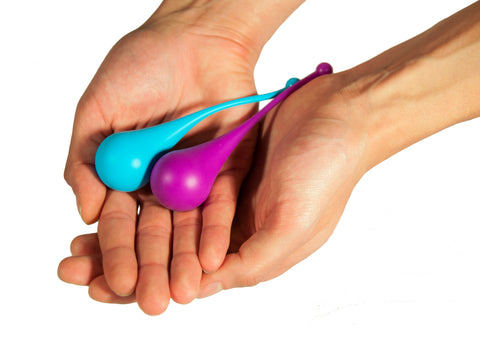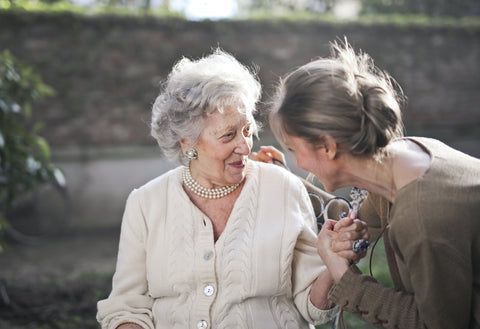Written by Daniel Martin, November 2023. Learn more about Senior Care
Aging is a natural part of life, and with it comes a variety of changes in our bodies. For many senior citizens, one common challenge they face is incontinence. Incontinence is the involuntary loss of bladder or bowel control, and it can affect seniors in different ways.
It's important to remember that incontinence is not something to be embarrassed about, and it's a problem that can be managed and treated with care and compassion.
We'll talk about why this happens, like how getting older and certain health problems can cause it. We'll also help you figure out what kind of incontinence your loved one might have. We'll give you tips on picking the right products to help with incontinence. Keeping things clean, and making a comfy and helpful space for your loved one.
Let's look into the causes, treatments, and lifestyle changes to better manage seniors. This guide is here to assist both caregivers and elderly individuals dealing with incontinence. We want to give you the information and tools you need to improve this condition. So that everyone can enjoy an improved quality of life.

Understanding the Causes of Incontinence in Senior Citizens
Incontinence in seniors often occurs due to many factors that impact bladder control:
Weak bladder muscles: The weakness makes it difficult to empty the bladder. The bladder may not contract enough to empty, leading to dribbling.
Pelvic floor dysfunction: Sometimes, the muscles in the pelvis are not strong enough. If there's been damage due to surgery, having a baby, or therapy, it can make it hard for the bladder to stay closed. This can cause pee to leak out when it's not supposed to.
Overactive bladder: Bladder muscles may lead to a sudden urge to urinate. This triggers urinary frequency and urgency.
Nerve damage: Illnesses like sclerosis, Parkinson's, stroke, or diabetes. This can harm the nerves that manage the bladder, causing pee problems.
Obstruction: When something like a big prostate in men or a problem with the uterus in women blocks the tube. It can lead to an incomplete emptying of the bladder. This condition can result in various urinary issues and discomfort.
Medications: Medicines like diuretics, sedatives, and muscle relaxants can make problems worse.
Senior care programs can help connect seniors to primary care doctors, urologists, or gynecologists who specialize in treating incontinence.
DO NOT SELF MEDICATE: SEEK MEDICAL ATTENTION BEFORE STARTING ANY MEDICAL TREATMENT!

Types of Incontinence Observed in Senior Citizens
There are several types of incontinence seen in the elderly:
Stress incontinence:
Urine leakage that occurs when sneezing, laughing, or exercising. It's caused by weak pelvic floor muscles unable to squeeze the urethra tight.
Urge incontinence:
Sudden urge to urinate followed by urine leakage. It's triggered by involuntary bladder muscle contractions.
Overflow incontinence:
Constant dribbling due to incomplete bladder emptying. Urine builds up until it leaks out.
Mixed incontinence:
A combination of stress and urge incontinence. This is the most common type in the elderly.
Transient incontinence:
Sometimes, individuals may experience urinary incontinence. Due to factors such as infection, constipation, and side effects from medication. These conditions can contribute to accidents with urine control.
Functional incontinence:
When someone is unable to reach the toilet due to a health condition, or an obstruction in their path. It can lead to accidents involving urine. This situation can be particularly challenging for individuals with limited mobility.

Non-Surgical Treatment Options for Managing Incontinence
There are several non-surgical treatment options that can manage urinary incontinence:
Bladder training:
This means peeing at certain times to learn how to control when you need to go to the bathroom.
Pelvic floor muscle exercises:
Also known as Kegel exercises, they make the muscles in your belly bottom stronger.
Biofeedback:
This uses electrical stimulation to strengthen and retrain pelvic floor muscles.
Periurethral bulking agents:
These bulk up the urethra tissue to prevent urine leakage. The effect lasts 6-24 months.
Pessaries:
These support devices help reposition the bladder to its normal angle and location.
Medications:
Anticholinergics, Mirabegron, Duloxetine, and Botox injections can help treat overactive bladder disorders.
Surgical Treatments for Severe Incontinence Cases
Before reaching out to a doctor, there are some helpful precautions to consider when dealing with incontinence. It's important to maintain good hygiene by regularly changing your absorbent products, washing your intimate areas with mild soap and water, and using a gentle moisturizer to prevent skin irritation.
Make your home more incontinence-friendly by having easy access to the bathroom and using non-slip mats to prevent falls. In social situations, choose seating near the restroom to reduce anxiety. These precautions can go a long way in enhancing comfort and confidence when living with incontinence.
For severe urine leakage that doesn't respond to other treatments. Healthcare providers may recommend the following surgical options:
Sling procedures: Surgeons place a small mesh to provide support and prevent leakage.
Artificial urinary sphincter: This is a device implanted around the urethra. So that the patient can control to open for urination or close to prevent leakage.
Catheterization: This involves inserting a thin tube into the bladder to drain urine on a regular schedule.
Urinary diversions: A surgical procedure that diverts urine flow away from a defective bladder. Surgeons may perform a surgical procedure to create a urine collection pouch.
THIS IS NOT A MEDICAL APPROVED ARTICLE. PLEASE CONTACT YOUR DOCTOR BEFORE TAKING ANY DECISONS

Lifestyle Changes to Help Manage Incontinence
Lifestyle changes can make a powerful impact on incontinence:
Limit bladder irritants:
Avoid alcohol, beverages, citrus, spicy foods, chocolate, and artificial sweeteners. These items can exacerbate certain health conditions or lead to discomfort.
Manage fluids:
Moderate fluid intake and avoid drinking large amounts before bedtime. Spread out fluid consumption throughout the day.
Exercise:
Low-impact exercises can help strengthen pelvic muscles. Avoid exercises that increase intra-abdominal pressure. Kegel exercises are particularly effective in managing incontinence. Take a look at our top kegel routines. You can use a kegel trainer to maximise your results.
Maintain healthy weight:
Extra weight puts pressure on the bladder leading to leakage. Losing excess weight can reduce symptoms.
Quit smoking:
Coughing from smoking worsens stress incontinence. Quitting can improve leakage.
Bowel regulation:
Stop constipation by eating right, drinking water, fiber stuff, and moving around a lot. Constipation can aggravate incontinence.
Toileting Support:
To stop leaks, you can use mats to prevent slipping in the bathroom and wear special pads or big kid diapers.
Coping with the Social and Emotional Impact of Incontinence
Beyond the physical symptoms, incontinence can take a major toll on a senior's emotional health and social connections. Here are some tips to overcome these challenges:
- Accept incontinence as a manageable medical condition like diabetes or hypertension. Do not feel ashamed.
- Confide in a close family member or friend who can provide support and understanding.
- Consider seeking counseling to address depression, isolation, or self-esteem issues related to incontinence.
- Continue to stay engaged in hobbies, social activities, and relationships you enjoy. Go out with adult incontinence pads.
- Join a support group to share experiences with others dealing with incontinence.
FAQs
Is incontinence a normal part of aging or should it be a cause for concern?While incontinence becomes more common, it is not an inevitable consequence of aging. A doctor should test incontinence to check for underlying causes that can treated.
Can lifestyle changes alone manage incontinence or is medical intervention necessary?Lifestyle remedies and behavioral modifications can help reduce bothersome symptoms. But are unlikely to resolve incontinence on their own. Most seniors need some medical treatment based on the type and severity of the leakage.
What are some common side effects of medications used to treat incontinence?Anticholinergic drugs can cause dry mouth, constipation, blurred vision, and confusion. Mirabegron can lead to increased blood pressure and frequency. Botox injections may cause urinary retention. Always weigh benefits vs potential risks.
THIS IS NOT A MEDICAL APPROVED ARTICLE. PLEASE CONTACT YOUR DOCTOR BEFORE TAKING ANY DECISONS
Conclusion
Incontinence can impact the quality of life for seniors. To deal with incontinence, it's important to know what causes it, what kind it is, and treatment options. While there's no one-size-fits-all cure. There are now many ways to make the symptoms better and help with daily life.
By making a plan to treat it and making some changes in how you live, most older people. This can get better control over their bladder and continue to have active, full lives.
One valuable tool we discussed earlier is Kegel exercises. These exercises focus on strengthening the pelvic muscles, which play a crucial role in controlling urinary and bowel functions. Kegels are simple to do and can be done discreetly, making them an excellent addition to an incontinence management plan.
Regular practice of Kegel exercises can lead to improved bladder and bowel control, increasing your confidence and reducing accidents. Seek professional advice, embrace lifestyle changes, and consider exercises like Kegels to empower yourself or your loved ones to live with comfort, dignity, and confidence.
Find out more about Kegel Excercises






